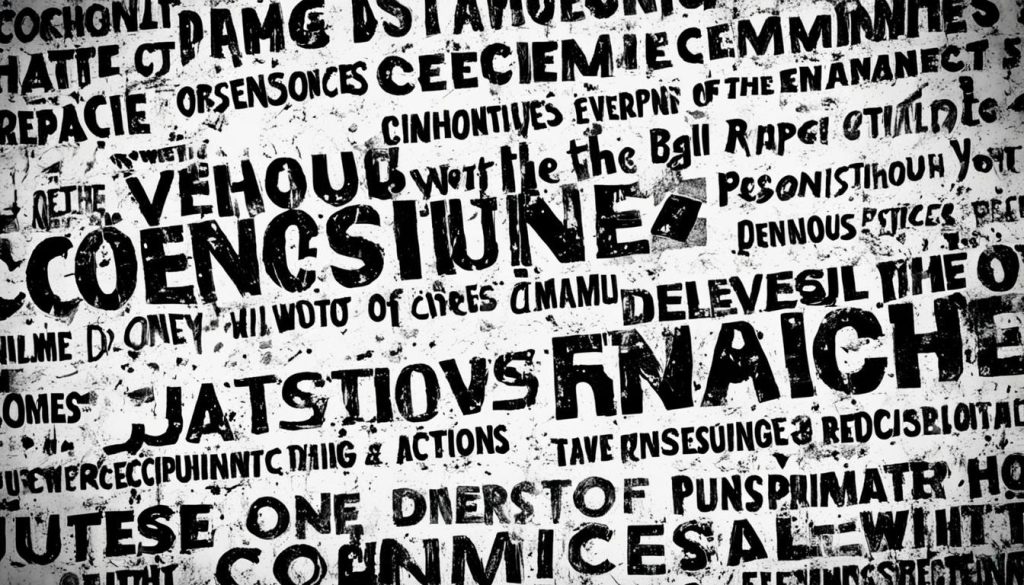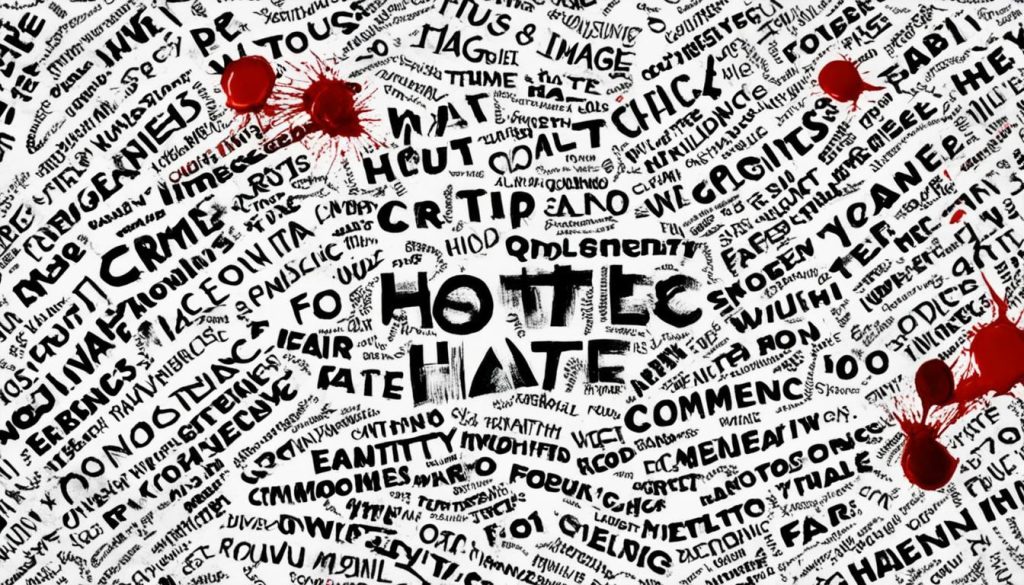Hate crimes hurt more than just the person attacked. They affect families, communities, and even the whole country. These crimes are done because of the victim’s race, religion, or other traits1. They leave victims and their communities feeling scared, alone, and unsafe.
It’s important to count and report hate crimes accurately. But, many crimes go unreported1. Laws at the federal and state levels make hate crimes worse and punish those who commit them.
Key Takeaways
- Hate crimes have a broader impact, affecting victims, their communities, and the nation as a whole.
- Hate crimes are bias-motivated offenses targeting individuals based on their perceived race, color, religion, national origin, sexual orientation, gender, gender identity, or disability.
- Underreporting of hate crimes is a significant problem, making accurate measurement and reporting crucial.
- Federal and state laws prohibit hate crimes and impose enhanced penalties on offenders.
- Hate crimes typically involve violent acts such as assault, murder, arson, vandalism, or threats.
- https://criminalinjurylaw.com/the-dirty-secret-of-hidden-lawyer-fees-what-they-wont-tell-you-until-its-too-late-4/
What Constitutes a Hate Crime?
Hate crimes are special kinds of criminal acts. They target people because of who they are. To be considered a hate crime, an act must have two main parts: the crime element and the hate element2.
The Crime Element
The “crime element” is the main criminal act. This can be violent, like assault or murder, or it can be property crimes, like vandalism2. Examples of hate crimes include burning a cross on a Black person’s property or putting up Nazi symbols on Jewish buildings2.
The Hate Element
The “hate element” is why the crime was done. It’s because of the victim’s race, religion, or other protected traits2. The accused’s words or actions can be used as evidence, but only if they’re directly linked to the crime2.
Hate crimes are very serious. They are often treated as a class C felony2. If someone commits another crime while doing a hate crime, they can face more charges2. Victims of hate crimes can also seek help outside of court2.
Hate crime laws are different in each place, but they all aim to protect people from bias-motivated crimes3. Knowing what makes a crime a hate crime is important for fighting these harmful acts2.
Why Have Hate Crime Laws?
Hate crime laws help address the wide impact of these crimes. They affect not just the victim but also communities and the nation4. These crimes have a big effect on people’s feelings, making them feel scared, alone, and at risk5. Laws with harsher penalties aim to stop these acts, show they won’t be ignored, and protect everyone’s civil rights5.
These laws aim to stop crimes based on bias and protect everyone’s rights, no matter who they are5. They understand that hate crimes can hurt whole communities and challenge equality and justice4.
Hate crime laws are key to keeping civil rights safe and making a place where everyone feels safe5. They make sure those who commit these crimes are held accountable. This sends a clear message that bias-motivated crimes are not okay4.
| State Hate Crime Law Coverage | Percentage of LGBTQ Population |
|---|---|
| States with laws covering sexual orientation and gender identity | 54%4 |
| States with laws covering sexual orientation only | 23%4 |
| States with laws interpreted to include sexual orientation and/or gender identity | 2%4 |
| States with laws not covering sexual orientation or gender identity | 17%4 |
| States with no hate crime laws | 4%4 |
Hate crimes hurt more than just the person who is attacked. They affect communities and challenge fairness and equality4. Laws against hate crimes are important. They help stop these crimes, protect everyone’s rights, and make a place where everyone feels safe5.
Reporting Hate Crimes
It’s vital to report hate crimes to tackle the issue fully and get a strong law enforcement response. Yet, many hate crimes go unreported, with studies showing only half are told to the police6. People might not report because they don’t trust the police or think nothing will happen.
Police need training to spot, investigate, and record hate crimes7. In New York City, the NYPD Hate Crime Task Force deals with all hate crimes and related cases7. The team helps victims by offering support from the Community Affairs team and the NYPD Hate Crime Task Force7.
We must improve how we report and handle hate crimes to fight bias-motivated crimes and help those affected678.
| Key Factors in Reporting Hate Crimes | Recommendations for Victims and Communities |
|---|---|
|
|
By fixing the issues with hate crime reporting and making police better at responding, we can support victims of hate crimes more. This helps us move towards a fairer and more welcoming society678.
hate crimes, legal penalties, criminal charges
At the federal level, hate crimes can lead to up to 10 years in prison. If the crime results in death, the sentence can be life imprisonment. Fines of up to $250,000 may also be given9. Many states have broader laws, defining hate crimes as separate offenses with their own penalties9.
Sentencing enhancements are another way to deal with hate crimes. Judges can give longer sentences if the crime was motivated by bias910. These laws aim to punish offenders and stop bias-motivated crimes. They also aim to protect communities from harm.
Hate crimes can lead to harsher penalties, increasing jail time from 6 months to over a year10. These crimes often lead to felony charges. This is especially true if they involve serious harm or sexual assault, leading to prison sentences over a year10.
| Offense | Penalty |
|---|---|
| Hate crime offense | Class C felony2 |
| Hate crime acts | Maliciously and intentionally due to the perception of the victim’s race, color, religion, ancestry, national origin, gender, sexual orientation, gender expression or identity, or mental, physical, or sensory disability2 |
| Penalties for hate crime offenses | Stipulated, but don’t restrict victims from seeking additional legal remedies2 |
Hate crime laws must be written carefully to protect free speech and follow the First Amendment9. If you face hate crime charges, getting a criminal defense lawyer is a good idea. They can help you understand the laws in your state and build a strong defense10.

State Hate Crime Laws
Federal laws cover hate crimes based on race, color, religion, and more. But, many states offer even more protection11. They include things like age, ancestry, and political beliefs in their laws11.
Broader Protections
Some states have laws against hate crimes like cross burning and harming religious places11. These laws show how states are working to fight bias crimes and protect everyone’s rights11.
About 54% of the LGBTQ population lives in states with hate crime laws for sexual orientation and gender identity4. 23% live in states with laws for sexual orientation only4. But, 17% live in states without these laws, and 4% live in states with no hate crime laws4.
This shows we need more consistent hate crime laws across the country11. It’s important to protect everyone from bias crimes for justice and equality11.
Penalties and Sentencing Enhancements
Many states have tough penalties for hate crimes9. These harsher sentences aim to punish hate crimes more severely. They also try to stop such harmful acts9. Offenders might face longer minimum sentences, possible felony charges instead of misdemeanors, and judges can give harsher sentences9.
In Alabama, hate crimes can get you locked up for 18 months to 15 years9. California has similar rules for hate crimes, but more serious acts can bring even more time1213. For instance, causing chaos can add one to three years to your sentence1213.
To convict someone of a hate crime, prosecutors must prove it was done because of the victim’s protected status9. Hate crimes are often treated as felonies, meaning more than a year in jail9. At the federal level, the punishment can be even harsher, up to life in prison or the death penalty9.
| State | Hate Crime Penalty | Underlying Offense Classification |
|---|---|---|
| Alabama | 18 months to 15 years | Felony |
| California | 1-3 years additional prison time | Misdemeanor to Felony |
| Federal | 10 years to life, or death penalty | Felony |

Related Offenses
There are many crimes linked to hate crime related offenses. These include bias-motivated crimes and civil rights violations. Laws cover things like planning against rights, harming people who are doing legal activities, damaging religious places, and stopping people from practicing their religion freely. These actions, though not always called hate crimes, show how laws tackle bias-motivated conduct that harms civil rights and certain groups.
In Alabama, the minimum time in jail for hate crime related offenses depends on the crime’s seriousness. For a Class D felony, it’s 18 months. For a Class C felony, it’s 2 years. A Class B felony gets you 10 years, and a Class A felony gets you 15 years. Misdemeanor hate crimes get at least 3 months in jail14. Alaska also increases sentences for felonies aimed at victims for their race, gender, or other protected traits14.
In New York, hate crimes are on the rise. They involve violence, threats, and damaging property because of bias and prejudice. People are targeted because of their race, color, or other traits15. Crimes like assault, intimidation, and vandalism can be seen as hate crimes15.
Not all these crimes are officially hate crimes, but they show how laws deal with bias-motivated conduct. The punishment for hate crimes depends on the crime’s seriousness. Violent crimes get harsher sentences15.
Conclusion
Hate crimes are a big problem, and the legal system tries to stop them. But, there’s still a lot to do to make sure everyone is safe and treated fairly16. Experts say around 250,000 hate crimes happened in the U.S. from 2004 to 201516. Sadly, about half of these crimes were not even reported to the police16.
Hate crimes affect not just the victims but also make communities feel scared and alone. Laws against these crimes aim to stop them from happening again and protect everyone’s rights17. For example, a man in Cincinnati was charged with a hate crime for hurting an Asian American student. Another man in Texas got 25 years in prison for attacking an Asian family during the COVID-19 pandemic17.
Even though we’ve made some progress, there’s still a lot to do. We need to keep working on reporting hate crimes and teaching people about them16. In 2019, many police departments said they didn’t have any hate crimes in their area. But, in the U.K., more crimes were reported because of better policies, and in the U.S., the number went down16. By making laws stronger, improving how we report crimes, and teaching people more, we can make a safer and more respectful world for everyone.
FAQ
What constitutes a hate crime?
A hate crime has two parts: a criminal act and a bias motivation. The act can be violent, like assault, or a property crime, like vandalism. The bias part means the crime was done because of the victim’s race, religion, or other traits.
Why are hate crime laws important?
Hate crime laws help deal with the wide impact of these crimes. They affect not just the victim but also communities and the nation. These laws aim to stop hate crimes, show they’re not okay, and protect everyone’s civil rights.
Why is reporting hate crimes important?
Reporting hate crimes helps us understand the problem and how to fight it. But, many crimes go unreported. Victims might not trust the police or think reporting won’t help. It’s important to improve reporting and how police handle these crimes to support victims and communities.
What are the federal penalties for hate crimes?
For hate crimes, the federal government can sentence someone to up to 10 years in prison. If the crime is more serious, like causing death, the sentence can be life imprisonment. There can also be fines of up to 0,000.
How do state hate crime laws differ from federal laws?
State laws often protect more groups than federal laws do. They might include age, ancestry, and political beliefs as protected traits. Some states also have specific laws against hate crimes like cross burning or damaging religious property.
What are some examples of hate crime-related offenses?
There are many laws against hate crimes and related acts. These include things like interfering with people’s rights or damaging religious places. These laws show how we try to stop bias-motivated actions that harm civil rights and target certain groups.

